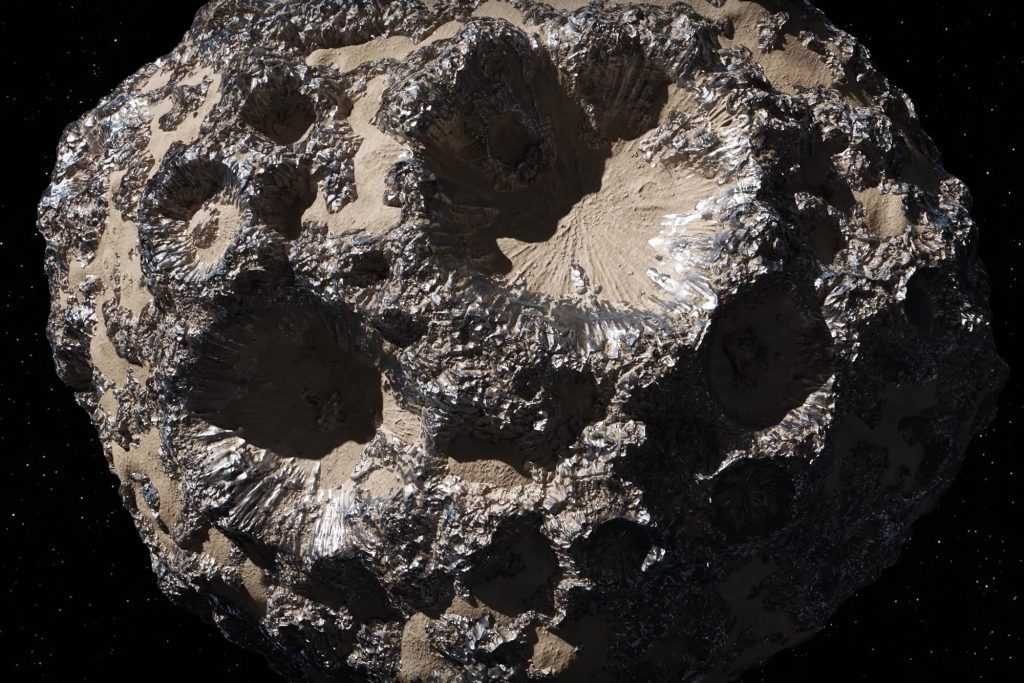

Astrônomos do MIT e de outros lugares mapearam a composição do asteroide Psyche, revelando uma superfície de metal, areia e rocha. Crédito: captura de tela da NASA
A superfície variada do asteróide Psyche sugere uma história dinâmica, que pode incluir erupções minerais, efeitos de agitação de asteróides e um manto rochoso ausente.
Ainda este anoE a[{” attribute=””>NASA is set to launch a probe the size of a tennis court to the asteroid belt, a region between the orbits of Mars and Jupiter where remnants of the early solar system orbit the sun. Once within the asteroid belt, the spacecraft will zero in on Psyche, a large, metal-rich asteroid that is thought to be the ancient core of an early planet. The probe, named after its asteroid target, will then spend close to two years orbiting and analyzing Psyche’s surface for clues to how early planetary bodies evolved.
Ahead of the mission, which is led by principal investigator Lindy Elkins-Tanton ’87, SM ’87, PhD ’02, planetary scientists at MIT and elsewhere have now provided a sneak peek of what the Psyche spacecraft might see when it reaches its destination.
In a paper published on June 15, 2022, in the Journal of Geophysical Research: Planets, the planetary science team presents the most detailed maps of the asteroid’s surface properties to date, based on observations taken by a large array of ground telescopes in northern Chile. The maps reveal vast metal-rich regions sweeping across the asteroid’s surface, along with a large depression that appears to have a different surface texture between the interior and its rim; this difference could reflect a crater filled with finer sand and rimmed with rockier materials.

This illustration, updated in April 2022, depicts NASA’s Psyche spacecraft. Set to launch in August 2022, the Psyche mission will explore a metal-rich asteroid of the same name that lies in the main asteroid belt between Mars and Jupiter. The spacecraft will arrive in early 2026 and orbit the asteroid – also shown in this illustration – for nearly two years to investigate its composition. Credit: NASA/JPL-Caltech/ASU
Overall, Psyche’s surface was found to be surprisingly varied in its properties.
The new maps hint at the asteroid’s history. Its rocky regions could be vestiges of an ancient mantle — similar in composition to the rocky outermost layer of Earth, Mars, and the asteroid Vesta — or the imprint of past impacts by space rocks. Finally, craters that contain metallic material support the idea proposed by previous studies that the asteroid may have experienced early eruptions of metallic lava as its ancient core cooled.
“Psyche’s surface is very heterogeneous,” says lead author Saverio Cambioni, the Crosby Distinguished Postdoctoral Fellow in MIT’s Department of Earth, Atmospheric and Planetary Sciences (EAPS). “It’s an evolved surface, and these maps confirm that metal-rich asteroids are interesting, enigmatic worlds. It’s another reason to look forward to the Psyche mission going to the asteroid.”
Cambioni’s co-authors are Katherine de Kleer, assistant professor of planetary science and astronomy at Caltech, and Michael Shepard, professor of environmental, geographical, and geological sciences at Bloomsburg University.
Telescope Power
The surface of Psyche has been a focus of numerous previous mapping efforts. Researchers have observed the asteroid using various telescopes to measure light emitted from the asteroid at infrared wavelengths, which carry information about Psyche’s surface composition. However, these studies could not spatially resolve variations in composition over the surface.
Cambioni and his colleagues instead were able to see Psyche in finer detail, at a resolution of about 20 miles per pixel, using the combined power of the 66 radio antennas of the Atacama Large Millimeter/submillimeter Array (ALMA) in northern Chile. Each antenna of ALMA measures light emitted from an object at millimeter wavelengths, within a range that is sensitive to temperature and certain electrical properties of surface materials.
“The signals of the ALMA antennas can be combined into a synthetic signal that’s equivalent to a telescope with a diameter of 16 kilometers (10 miles),” de Kleer says. “The larger the telescope, the higher the resolution.”
On June 19, 2019, ALMA focused its entire array on Psyche as it orbited and rotated within the asteroid belt. De Kleer collected data during this period and converted it into a map of thermal emissions across the asteroid’s surface, which the team reported in a 2021 study. Those same data were used by Shepard to produce the most recent high-resolution 3D shape model of Psyche, also published in 2021.
À esquerda, este mapa mostra as características da superfície em Psique, desde áreas arenosas (roxas/baixas) até áreas rochosas (amarelas/altas). O mapa à direita mostra a abundância de minerais em Psique, do baixo (roxo) ao alto (amarelo).
para acompanhar a partida
No novo estudo, Cambioni executou simulações de Psyche para descobrir quais propriedades de superfície podem melhor corresponder e explicar as emissões de calor medidas. Em cada uma das centenas de cenários simulados, ele mapeou a superfície do asteroide com diferentes combinações de materiais, como regiões com diferentes abundâncias minerais. Ele modelou a rotação do asteroide e mediu como materiais simulados no asteroide emitiriam emissões de calor. A Campione procurou então as emissões simuladas que melhor correspondiam às emissões reais medidas pelo ALMA. Esse cenário, ele acredita, revelará o mapa mais provável do material da superfície do asteroide.
“Fizemos essas simulações região por região até que pudéssemos identificar diferenças nas propriedades da superfície”, diz Campione.
O estudo produziu mapas detalhados das propriedades da superfície de Psyche, mostrando que a interface do asteroide provavelmente é coberta por uma grande variedade de materiais. Os pesquisadores enfatizaram que a superfície de Psyche em geral é rica em minerais, mas a abundância de minerais e silicatos varia de acordo com sua superfície. Isso pode ser mais um indício de que o asteroide, no início de sua formação, pode ter tido um manto rico em silicatos que já desapareceu.
Eles também descobriram que, à medida que o asteroide orbitava, o material no fundo de uma grande depressão – provavelmente uma cratera – mudava de temperatura muito mais rápido do que o material ao longo da borda. Isso indica que o fundo da cratera é coberto com “poças” de material de grão fino, como areia no chão, que aquece rapidamente, enquanto as bordas da cratera são feitas de material rochoso mais lento e quente.
“Lagoas de material de granulação fina foram vistas em pequenos asteroides, sua gravidade é baixa o suficiente para que choques de agitação na superfície causem a agregação de material mais fino”, diz Campione. “Mas Psyche é um corpo grande, então se o material de granulação fina se acumula no fundo da depressão, isso é bastante interessante e misterioso.”
“Esses dados mostram que a superfície de Psyche é heterogênea, com diferenças marcantes na composição”, diz Simone Marchi, cientista do Southwest Research Institute e co-investigadora da missão Psyche da NASA, que não esteve envolvida no estudo atual. “Um dos principais objetivos da missão de Psyche é estudar a composição da superfície do asteroide usando raios gama, um espectrômetro de nêutrons e um imageador de cores. Portanto, a presença potencial de genes de composição é algo que a equipe de psicologia está ansiosa para estudar mais. “
Referência: “The Heterogeneous Surface of Asteroid (16) Psyche” de Saverio Campione, Catherine de Clare e Michael Shepherd, 19 de maio de 2022, disponível aqui. Jornal de Pesquisa Geofísica: Planetas.
DOI: 10.1029/2021JE007091
Esta pesquisa foi apoiada por uma bolsa de pós-doutorado EAPS Crosby Distinguished e, em parte, pela Fundação Heising-Simons.

“Encrenqueiro. Viciado em mídia social. Aficionado por música. Especialista em cultura pop. Criador.”




More Stories
Inspetor Geral da NASA emite relatório contundente sobre atrasos no projeto de lançamento da espaçonave SLS
Uma vaca marinha pré-histórica foi comida por um crocodilo e um tubarão, segundo fósseis
Nova pesquisa sobre uma enorme falha de impulso sugere que o próximo grande terremoto pode ser iminente